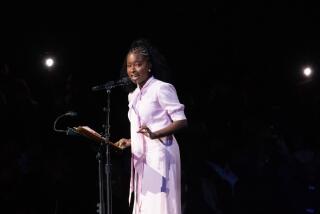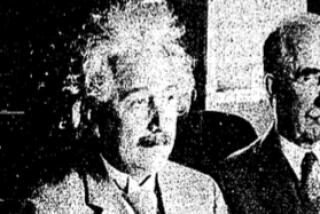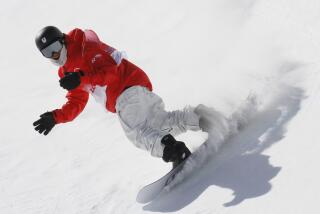Breaks 1873 Record : Cold? It Was Probably the Coldest Ever
WASHINGTON — How cold was it?
It was so cold in the nation’s capital for President Reagan’s inaugural weekend that the official public ceremonies scheduled for the steps of the Capitol today had to be moved inside. And the traditional parade down Pennsylvania Avenue was canceled--to the dismay of many and the relief of some, including one band leader who had predicted that horns would freeze in the arctic weather and spectators would hear nothing but the drums.
It was so cold that even before the decision to move the public ceremonies indoors and scrub the parade, the President canceled an outdoor inaugural youth program Sunday at the Jefferson Memorial because he did not want people spending hours in temperatures that--with the windchill factor--were the equivalent of 22 degrees below zero.
Grant’s Oath-Taking
It was so cold that when Reagan took his oath of office at a private ceremony in the White House, it was probably the coldest day on which a President of the United States was ever sworn in. The 9-degree mark shattered the 16-degree record set more than a hundred years earlier, in March, 1873, when Ulysses S. Grant took the oath for his second term.
It was not so cold that socializing stopped. Inaugural partying knows no bounds on either the Fahrenheit or Celsius scales. And Sunday was filled with rounds of lunches, receptions, Super Bowl gatherings and the like.
This inaugural weekend stood in startling contrast with Reagan’s first inauguration in 1981, when temperatures climbed to a high of 55 degrees, matching the previous record high for an inauguration set in March, 1913, when Woodrow Wilson was sworn into office.
The National Weather Service predicted that today’s temperatures in Washington could fall to as low as 30 to 50 degrees below zero with the windchill factor, making it dangerous for participants and spectators alike to be outdoors because of the possibility of frostbite or worse.
“I want to tell you, I want to cry,” said Ron Walker, chairman of the 50th American Presidential Inaugural Committee, who had been planning the outdoor inaugural festivities for months. He said that plans were being made to hold the swearing-in ceremony and delivery of the presidential inaugural address inside the Capitol.
The biting weather denied nearly 12,000 parade participants from all 50 states their day in the national spotlight. The roster included 8,358 high-school, college and military band members, 2,502 members of civilian and military marching units, 230 persons on 11 major floats, 686 horseback riders and one 21-dog dog sled. All of the 112 groups in the parade had come to Washington at their own expense.
Up to 350,000 people--25,000 of whom had paid a total of more than $800,000 for choice viewing spots--had been expected to line Pennsylvania Avenue for the parade. An inaugural spokesman said the ticket holders will be given refunds. The cancellation of Reagan’s swearing-in ceremony on the Capitol steps disappointed as many as 140,000 other celebrants who had tickets to that event.
Walker said the President and First Lady Nancy Reagan agreed to a proposal that all parade participants, many of whom had traveled long distances and rehearsed for weeks for the big day, would be invited to gather at the Capital Centre coliseum just outside Washington, where the Reagans would thank them for their efforts.
News of the parade cancellation caused tears and anger among the 150 members of the Glen A. Wilson High School Marching Band from Hacienda Heights, Calif., which had expected to lead the cavalcade. Band members had raised and borrowed $110,000 to make the 3,000-mile trip to Washington.
The musicians have never performed in weather colder than 50 degrees. When they assembled in 30-degree weather Saturday to practice the “Purple Carnival March”--the number they were to perform during the three-mile parade--their instrument valves froze shut.
“We’ve gone to all this trouble, and we get a one-word answer--no--that we can’t perform,” said Wilson High senior Pat Metoyer, a tuba player. “Even though it’s freezing, it’s extremely disappointing. I wouldn’t have minded the cold at all. This really stinks.”
The parade cancellation may have been doubly disappointing for the tiny marching band from Weeping Water (Neb.) High School, which was already braced for a frigid Inauguration Day. For the last two weeks, the band’s 38 members had marched daily in Nebraska’s subzero weather to prepare for their appearance.
Despite the cold, the weekend included special events sponsored by the President, vice president, veterans, volunteers, youth groups, conservatives, athletes, blacks, Teamsters, Asians and Latinos.
Reagan had 179 luncheon guests at the White House, including many Cabinet and White House staff aides, after the private swearing-in ceremony Sunday.
Separate Super Bowl parties were hosted on Sunday by Vice President George Bush, Frank Sinatra, Sen. Pete Wilson (R-Calif.), General Electric Co., the black inaugural advisory committee and the Jefferson Educational Foundation, one of several conservative, youth-oriented groups present here.
More than 1,000 people, most of them Californians, watched the Super Bowl in a warm, rowdy atmosphere at the Wilson party.
More to Read
Sign up for Essential California
The most important California stories and recommendations in your inbox every morning.
You may occasionally receive promotional content from the Los Angeles Times.










